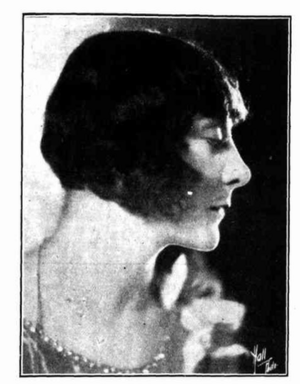Paulette McDonagh facts for kids
Paulette de Vere McDonagh (born June 11, 1901 – died August 30, 1978) was an Australian film director. She often worked closely with her sisters, Phyllis and Isabella. In 1933, people said she was one of only five female film directors in the entire world!
The sisters once had a chance to go to Hollywood. Phyllis McDonagh explained, "Fox Films wanted to send us." But they were smart. They decided they would be "small fish in a big pond" there. In Australia, they already had jobs and a good reputation.
Contents
Paulette's Early Life and Career
Paulette McDonagh was born in Sydney on June 11, 1901. She was one of seven children born to Annie Jane Amora and John Michael McDonagh.
She went to school at the Catholic Kincoppal School in Elizabeth Bay, Sydney.
Working with Her Sisters
Paulette worked with her sisters, Isabel and Phyllis, to make movies. They were business partners in the Australian film industry during the 1920s and 1930s. Paulette was the youngest. She was known for writing and directing their films. Phyllis handled publishing and promoting. Isabel was the main actress, the star of their movies.
The McDonagh family was artistic and wealthy. Their beautiful home often became the fancy background for many of their films. It was filled with old furniture and rich colors.
Their First Film: Those Who Love
Their first silent film was called Those Who Love (1926). Their family helped pay for it. Paulette took over directing the movie. This happened after some disagreements with another director, P. J. Ramster.
The sisters took a big chance by making this film. It paid off! The magazine Everyone's gave them a fantastic review. They said the movie was a "dazzling triumph." They even called it the best Australian film ever made at that time. The review also praised Isabel's acting, saying it was "remarkable."
More Silent Films
After Those Who Love was a success, the McDonagh sisters made more silent films. These included The Far Paradise (1928) and The Cheaters (1930).
The Far Paradise was very popular and earned a lot of money. People loved its artistic style. This style was influenced by Australian films, Hollywood dramas, and German art.
Paulette, as the director, made Isabel's character very interesting. Isabel played a heroine who was different from most women in films back then. She was shown breaking into places, opening safes, and even with a lover. At that time, it was unusual to see women doing such things on screen. This made their silent films more exciting and popular with a wider audience.
Even with a small budget, the sisters created exciting dramas. These films often featured romance, big sacrifices, and parents who didn't approve.
Awards and Later Life
In 2001, Paulette McDonagh was honored. She was added to the Victorian Honour Roll of Women.
End of Her Film Career
Isabel and Phyllis eventually stopped working in the film industry. Paulette tried to keep making movies on her own, but it was hard. In 1934, she started a job to work on a big romantic movie. It was about the life of Reverend John Flynn.
However, the movie ran out of money. Paulette also had no one to act or produce the film. So, she had to stop the project.
After her film career ended, Paulette continued to live with her younger siblings. She passed away in Sydney on August 30, 1978.
See also
 In Spanish: Paulette McDonagh para niños
In Spanish: Paulette McDonagh para niños
 | Bayard Rustin |
 | Jeannette Carter |
 | Jeremiah A. Brown |


